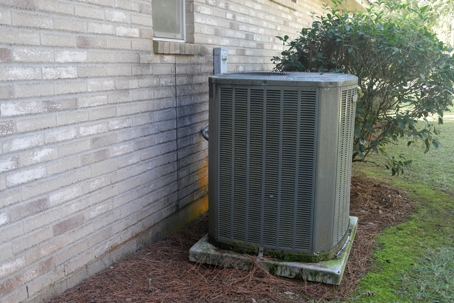Understanding Your Air Conditioner's Age
Knowing how old your air conditioner is can help you determine how much more "mileage" you're likely to get out of it. A well-maintained system should last about 15-20 years, but if the system has been severely neglected (i.e. zero maintenance), the lifespan could be closer to 10-15 years.
An air conditioning system replacement is among the more costly home improvement purchases you'll make, so it can be helpful to have some idea of how long you'll have to budget for the replacement.
You Might Also Like: How Do I Tell How Old My Furnace Is?
Locate the Manufacturer's Label
Finding out the age of your air conditioner starts with a bit of detective work, and the first clue lies in locating the manufacturer's label. Typically, this label is affixed to the exterior of the unit, either on the back, side, or inside the access panel. The location can vary depending on whether you have a split system or a central AC system.
This label is a treasure trove of information, containing not just the model and serial numbers, but also technical specifications that can be crucial for repairs and understanding your unit's capabilities. It's the starting point for any homeowner, property manager, or DIY enthusiast looking to get to the bottom of their air conditioner's history.
Deciphering the Serial Number
Once you've located the manufacturer's label, the serial number is your next piece of the puzzle. Manufacturers often encode the date of manufacture within these numbers. It might seem like a cryptic string of characters at first, but with a little know-how, you can crack the code.
Some brands use a straightforward approach where the first digits represent the year and month, while others may have a more complex coding system. Understanding these serial number date codes can sometimes feel like you're deciphering hieroglyphics, but fear not—many manufacturers provide guides or customer service to help you interpret this vital information.
Therefore, your next step is to search online for "how to read a [manufacturer] air conditioner serial number," and the answer should appear in search results towards the top of the page. If you prefer, you can contact the manufacturer and give them the serial number, and they should be able to tell you your unit's age.
DETERMINING THE MANUFACTURE DATE
Consulting the User Manual or Warranty
If the manufacturer's label has left you with more questions than answers, the user manual or warranty documents that came with your air conditioner can be your next best resource.
These documents often include a section on specifications that will list the manufacture date or provide instructions on how to find it. Moreover, warranty documents can offer insights into the expected lifespan of your unit, which is closely tied to its age.
Keeping these documents in a safe place is a good practice for any homeowner, as they can be invaluable when it comes to understanding and maintaining your home appliances.
Contacting the Manufacturer
When all else fails, going straight to the source can yield the answers you need. Reaching out to the manufacturer with your air conditioner's model and serial number in hand can provide you with the most accurate information regarding its age.
Customer service representatives are usually equipped to help you decipher the serial number or look up the manufacture date in their systems. This step can be especially helpful if you've moved into a home with an existing unit and have no prior records or manuals to consult. A quick call or email could save you a lot of guesswork and set you on the right path for understanding your AC's life story.
SIGNS OF AN AGING AIR CONDITIONER
Efficiency and Performance Indicators
Like any appliance, air conditioners show their age through changes in performance and efficiency. One of the most telling signs is a noticeable increase in your energy bills, which can indicate that your AC is working harder to cool your home, thus becoming less efficient.
Another red flag is a decline in cooling capacity; if your home isn't reaching the same comfortable temperatures it used to, or if it's taking longer to cool down, these could be signs that your AC unit is getting on in years. Other symptoms to watch for include strange noises, frequent cycling, or the need for more frequent refrigerant top-ups—all indicators that your air conditioner may be approaching retirement.
Physical Condition Assessment
Conducting a visual inspection of your air conditioner can also reveal signs of aging. Check for rust, corrosion, or other signs of wear and tear on the exterior and interior components. If the unit has a buildup of dirt or debris, or if the insulation on the refrigerant lines is deteriorating, these can be indicators that your AC has seen better days.
Physical condition assessments should be done carefully, and if you're not confident in what to look for, it's always best to consult a professional. Remember, an aging AC not only affects comfort but can also become a safety hazard if not properly maintained or replaced in time.
DALLAS AC INSTALLATION
AC Replacement Techs Serving the Dallas Metro Area
If you're a homeowner in the Dallas metro area, and you're noticing the signs of an aging air conditioner, or if you're simply interested in the benefits of upgrading to a modern system, Rescue Air and Plumbing is here to help. Our experienced team can assist you in determining the age of your unit, provide maintenance to extend its life, or guide you through the process of selecting and installing a new, energy-efficient system.
Don't let an old AC compromise your comfort—contact us today to explore your options and ensure your home stays cool and comfortable all year round.

